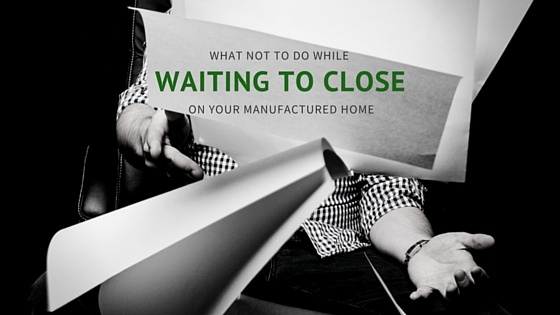What You Shouldn’t Do While Waiting to Close On Your Manufactured Home
June 28, 2016

So, all that hard work behind turning your homeownership dream into reality has finally paid off. Not only have you found a great manufactured home that meets your needs and expectations; you’ve also signed the loan agreement and set the closing date. But even though the closing date is just around the corner, a few missteps could increase your interest rate, or worse, cost you the dream of owning a home.
Lenders monitor everything that may affect the financial situation of an applicant that has been approved for a manufactured home until he becomes the legal owner of his purchased property. Below you can find a few important things you should avoid while waiting to close on your manufactured home.
Apply for new credit.
You may feel that new appliances, furniture or a new car would be a nice addition to the home you’ve just bought; however, waiting until after the closing date will be in your best interest. Whether you intend to apply for an auto loan, use all the available credit on your credit cards, get a new credit card or open a store-based credit line, purchasing new things will add to your debt, throwing off your debt-to-income ratio above requirements and lowering your credit rating. Considering that your lender will review your credit score prior to the closing day, he may increase your interest rate or halt the closing and decline your loan if your financial situation has changed.
Close unused credit accounts.
The debt-to-credit (DTI) limit ratio is another criterion your lender will check just before the closing. According to FDIC, closing a line of credit will increase the amount you owe on your credit cards compared to your credit limit, negatively impacting your DTI ratio and weakening your credit profile. Since you got qualified for a manufactured home loan based on your current credit profile, closing one of your credit accounts carries the risk of falling into an unacceptable credit situation, which could ruin your chances to close on your manufactured home.
Forget to file your federal taxes or pay bills on time.
While waiting to close on your manufactured home, you need to take care of all relocating responsibilities. Some tasks to consider are: packing your stuff, hiring a moving company, enrolling your children in new schools, finding a temporary place to stay, and so on. With so much going on in your life, it’s easy to let a few bills slip through the cracks. Paying your bills or taxes late could lead to serious problems, aside from the late-payment penalties. For instance, the lender might get the false impression that you’re no longer able to make timely payments. In addition, if you’re past due on your federal income taxes, the IRS can file a tax lien, which will appear on your credit report and may harm your credit score.
Change jobs.
Applicants switching jobs is another frequent hiccup our manufactured home loan specialists have come across during the closing process on manufactured homes. Now, don’t get us wrong. While a change in the job status from part time to full time is always welcome (even recommended, sometimes), a change that lowers your income or replaces a wage-based pay structure with self-employment or a commission-based pay plan isn’t a wise move. Getting a higher-paying job might also be a problem. The lender will need to reassess your employment history and verify recent pay stubs to confirm your eligibility for the manufactured home loan, causing a delay in the closing.
One last thought: while waiting to close on your manufactured home, do not accept advice from unqualified individuals. A person who has no clue about the manufactured home lending industry could give you wrong advice, which may ruin your chances of closing on the manufactured home you love. If in doubt, we invite you to contact our fully licensed, highly experienced professionals at Triad Financial Services. Proudly serving current and potential manufactured home buyers in 42 states, our experts will be more than happy to discuss the manufactured home financing options available to you along with the dos and don’ts, and the ins and outs of getting a manufactured home loan.
